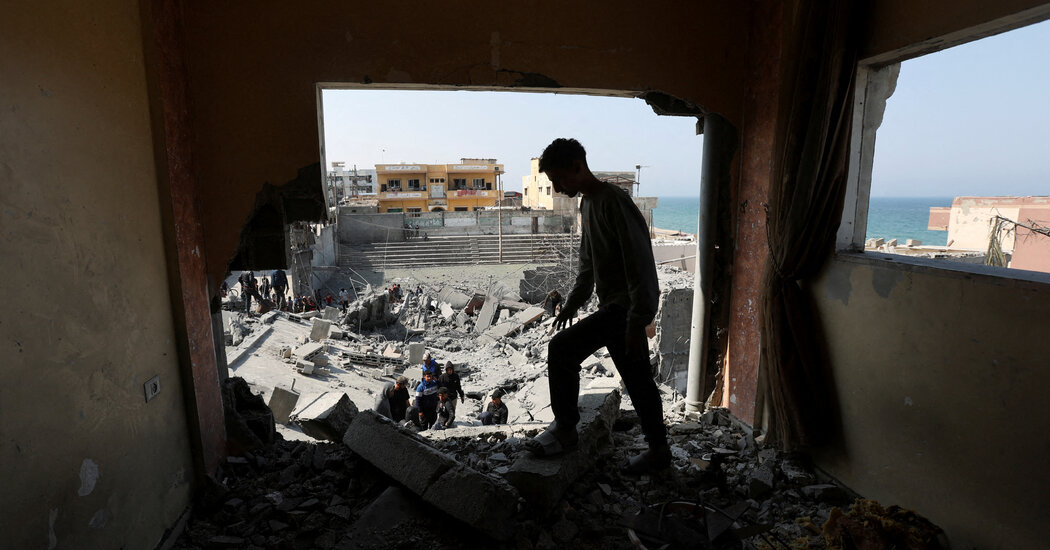Palestinians in Gaza were filled with fear and frustration on Tuesday as they reeled from a wave of Israeli airstrikes on the territory.
After two months of relative quiet during a cease-fire, the widespread explosions shaking homes and tents left Gazans with an unmistakable message: The war had returned, at least for now.
“We’re back to living through this nightmare,” said Mohammed Fares, 24, who was displaced to Khan Younis in Gaza’s south after his home in Gaza City was destroyed early on in the war.
On Tuesday before sunrise, the Israeli military said it was carrying out attacks against Hamas in Gaza, and some 12 hours after they began said that they were still going on. The attacks, which hit during the Muslim holy month of Ramadan, followed weeks of unsuccessful negotiations on an extension to the cease-fire between Israel and Hamas.
Gaza’s Health Ministry said that more than 400 people had been killed. The ministry’s count does not distinguish between civilians and combatants. Hamas publicly announced the deaths of at least five senior officials among the group’s Gaza leadership.
When Israel launched the strikes around 2 a.m., some people were preparing a special meal before the daily Ramadan fast, while others were jolted out of their sleep.
“At the same moment, there were violent explosions everywhere,” said Yahya Masri, 29, a resident of Gaza City. “Everyone was asking, ‘What’s going on? What’s happening?’”
Mr. Masri said Israel had carried out some airstrikes in recent days, but the intensity of the assault on Tuesday morning reminded him of the worst moments of the war.
Rosalia Bollen, a spokeswoman for UNICEF, the United Nations children’s agency, who is working in Al-Mawasi, a coastal area designated as safer for civilians by Israel’s military, said she was awakened at around 2:10 a.m. by “very, very loud explosions.” She said the entire guesthouse where she was staying “was shaking violently.”
Ms. Bollen described an intense 15 minutes of consecutive airstrikes, followed by sporadic bombardment for the rest of the night. “Every five or six seconds there were very loud explosions, just uninterrupted,” said Ms. Bollen. “After it subsided, I could hear people yelling outside.”
“Ambulances have been driving back and forth all night,” said Ms. Bollen, who emphasized that Gaza’s hospitals were collapsing and unable to accommodate the new wave of wounded people. “They don’t have antibiotics, syringes, or gauze,” she said.
Mahmoud Basal, spokesman in Gaza for the Palestinian Civil Defense, a rescue and emergency service, said the aftermath of the bombardment was “catastrophic.”
“We are facing a very harsh reality where the massive efforts by medical teams and rescue crews do not rise to the scale of the existing disaster,” he said in a voice message on Tuesday.
Mr. Basal said that the high numbers of dead and injured were partly because houses were full of people who had returned to their neighborhoods during the cease-fire and were sheltering together in the few homes that remained standing. “Each house had at least 20 people inside,” he said, adding: “There are entire families that were buried under the rubble.”
For weeks, Israel and Hamas have failed to move from the first stage of the cease-fire agreement signed in January to the second stage, which calls for the end of the war and a complete Israeli withdrawal.
Prime Minister Benjamin Netanyahu has said that for the war to end, Hamas’s government and military wing must be dismantled, a position shared by his right-wing coalition partners in the government. Hamas has suggested it was willing to give up civilian governance of Gaza, but has firmly rejected dissolving its military wing, a critical source of its power in the enclave.
That disagreement has made Palestinians in Gaza concerned that any cease-fire would only be temporary.
“We were hopeful about the cease-fire, but now we’re worried we’ll be stuck in this situation with no end,” Mr. Fares said. “We have a bad feeling.”
Akram al-Satri, a 47-year-old translator from Khan Younis, said he had heard explosions in the night followed by “the screams of people and the sirens of ambulances.”
Mr. al-Satri said an entire family had been killed in his neighborhood of Khan Younis . “Fear is coming back full-fledged to the Gaza Strip,” he said.
Rawan Sheikh Ahmad contributed reporting from Haifa, Israel.











